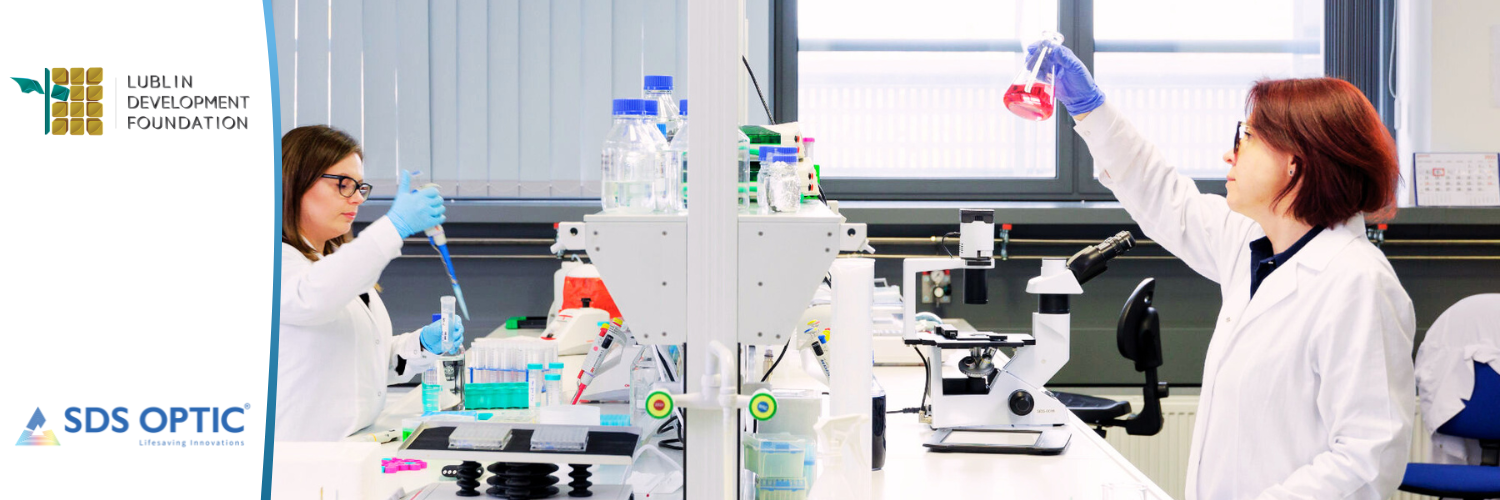
- Network partners
- Sector group
-
Healthcare
- Countries
-
POLAND
On the face of it, there is no link whatsoever between mining for coal and detecting breast cancer cells. Unless, of course, you look at the sub-microscopic detail.
Marcin and Magdalena Staniszewski have married, literally and technically, their respective skills to develop a revolutionary probe for the most aggressive breast cancer, known as HER2.
During his career, Marcin had applied fibre optics technology to detect rock vibrations in coal mines. Magdalena’s speciality was the molecular basis of diseases, identifying targets and developing novel therapeutic strategies. Together, they often discussed their fields of expertise, contemplating how they could merge their knowledge to create something impactful.
The detection of small molecules in oncology emerged as a promising application for the novel approach, combining optoelectronics and molecular biology. This has special significance as the medical world is always seeking new technologies with higher reliability and faster results to increase cancer survival rates and improve patient well-being.
Groundbreaking inPROBE plus top-notch business development
The result is the inPROBE medical device, the first ever to be used that gets immediate information from the living patient, ‘in vivo’. The technology consists of a biosensor (micro-probe) and analysing instrument. This detects HER2 positive breast cancer markers in real time, an absolute novelty in medical science. Last but not least: it doesn’t even require tissue removal as in the case of a biopsy. And gone are the days where the patient has to wait weeks for a result. The entire process takes minutes.
In 2015 while the inPROBE sensor was being developed, Marcin and Magdalena set up a deeptech company called SDS Optic with the support of the third co-managing expert Mateusz Sagan – an extremely talented business development manager with years of experience under his belt. This Polish biotech start-up promised to tackle cancer and other disease diagnostics using the revolutionary probe.
All-important timely funding
The biggest challenges in deeptech industry where a start-up is developing significant scientific advances are time, money and resources. It usually takes from 8 to 20 years to market the product, and because of clinical trials and certification, proof of the accuracy and safety of the technology regarding human health must be obtained. SDS Optic needed much more capital than average software start-ups usually do, to avoid failure when they entered the most capital-intensive phase of development.
Due to the foresight and determination of its founders at its inception, SDS Optic initially received substantial funding from the National Centre of Research and Development (NCBR). Application to the Polish platform Strategmed for prevention and treatment of diseases of civilisation secured a successful grant along with numerous awards from the NCBR.
Following up in 2017 as part of the Horizon 2020 programme, the European Commission was hand-picking potentially disruptive businesses to invest in and support as part of the SME Instrument. SDS Optic received a grant for almost EUR 4 million to finance the optimisation of the so-called SDS-OmiProbe device, independent clinical trials, certification and commercialisation.
Enter Enterprise Europe Network support for SME development
"Almost from the very beginning, we received a great deal of support from Enterprise Europe Network," Marcin said. The Lubelska Fundacja Rozwoju, one of the Network host organisations in eastern Poland, helped the start-up find the proper business mentor through Key Account Manager services. The company’s goal was to find a person with broad knowledge, expertise and contacts within the medical devices and services industry who could contribute to the company’s development with an emphasis on marketing, certification and foreign expansion.
Once the company’s needs were identified, Network consultant Cezary Pasternak, with the help of tools such us case tracker tool and CoachMatch platform, helped to find the right coach. Robert Boesecke emerged as a perfect match. He had previously established, commercialised and just recently sold his own medtech venture. "The company finally chose Robert, an expert with many years of invaluable experience in the industry," Cezary recalled.
Pathway into the future for inPROBE technology
To pave the way for the presence of SDS Optic on the stock exchange, the Network applied its Innovation Health Report at the initial public offering stage when the shares were made available to the public for the first time. This resulted in several intern improvements and an all-important raised company awareness in this highly competitive deep-innovations market.
Now, SDS Optic is recognised as one of the most innovative companies in Europe. Having gained the trust of private and institutional investors and become a publicly listed company at NewConnect Stock Exchange Market, it has almost tripled its market capital from its debut in March 2022.
Through the years they have built a strong team and increased employment up to almost 40 employees, among them, renowned scientists and business experts. The company has massive space with labs in Poland and the United States.
Management has consistently received nominations and titles of the most distinguished awards for outstanding business and scientific results.
Accolades all around, SDS Optic was also commended by the Network to the European Innovation Radar platform and Magdalena won the Innovation Radar Prize 2020 competition in the Women-led Innovation category.
inPROBE has become a unique platform technology. The research and development team have already put in the pipeline other diverse applications such as a drug delivery monitoring probe and an infectious diseases diagnostic device. Diagnosis of other cancers, including colon and renal, are also a real possibility.
Currently, diagnostics give only 60 % accuracy and, as a result, about 750 000 people around the world die from breast cancer. SDS Optic research aims to overturn this to increase breast cancer survival rate by a massive one third.
Mateusz concluded: "Thanks to the Enterprise Europe Network’s help in finding the proper coach under the European Commission business mentoring training within the Horizon 2020 scheme, we could derive from the best expertise and practice in the medical devices industry." And importantly, "we still derive from the know-how we received during that time."